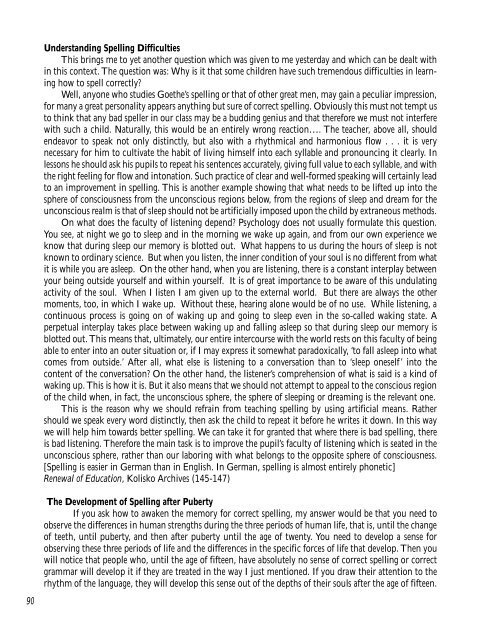Colloquium on English - Research Institute for Waldorf Education
Colloquium on English - Research Institute for Waldorf Education
Colloquium on English - Research Institute for Waldorf Education
You also want an ePaper? Increase the reach of your titles
YUMPU automatically turns print PDFs into web optimized ePapers that Google loves.
90<br />
Understanding Spelling Difficulties<br />
This brings me to yet another questi<strong>on</strong> which was given to me yesterday and which can be dealt with<br />
in this c<strong>on</strong>text. The questi<strong>on</strong> was: Why is it that some children have such tremendous difficulties in learning<br />
how to spell correctly?<br />
Well, any<strong>on</strong>e who studies Goethe’s spelling or that of other great men, may gain a peculiar impressi<strong>on</strong>,<br />
<strong>for</strong> many a great pers<strong>on</strong>ality appears anything but sure of correct spelling. Obviously this must not tempt us<br />
to think that any bad speller in our class may be a budding genius and that there<strong>for</strong>e we must not interfere<br />
with such a child. Naturally, this would be an entirely wr<strong>on</strong>g reacti<strong>on</strong>…. The teacher, above all, should<br />
endeavor to speak not <strong>on</strong>ly distinctly, but also with a rhythmical and harm<strong>on</strong>ious flow . . . it is very<br />
necessary <strong>for</strong> him to cultivate the habit of living himself into each syllable and pr<strong>on</strong>ouncing it clearly. In<br />
less<strong>on</strong>s he should ask his pupils to repeat his sentences accurately, giving full value to each syllable, and with<br />
the right feeling <strong>for</strong> flow and int<strong>on</strong>ati<strong>on</strong>. Such practice of clear and well-<strong>for</strong>med speaking will certainly lead<br />
to an improvement in spelling. This is another example showing that what needs to be lifted up into the<br />
sphere of c<strong>on</strong>sciousness from the unc<strong>on</strong>scious regi<strong>on</strong>s below, from the regi<strong>on</strong>s of sleep and dream <strong>for</strong> the<br />
unc<strong>on</strong>scious realm is that of sleep should not be artificially imposed up<strong>on</strong> the child by extraneous methods.<br />
On what does the faculty of listening depend? Psychology does not usually <strong>for</strong>mulate this questi<strong>on</strong>.<br />
You see, at night we go to sleep and in the morning we wake up again, and from our own experience we<br />
know that during sleep our memory is blotted out. What happens to us during the hours of sleep is not<br />
known to ordinary science. But when you listen, the inner c<strong>on</strong>diti<strong>on</strong> of your soul is no different from what<br />
it is while you are asleep. On the other hand, when you are listening, there is a c<strong>on</strong>stant interplay between<br />
your being outside yourself and within yourself. It is of great importance to be aware of this undulating<br />
activity of the soul. When I listen I am given up to the external world. But there are always the other<br />
moments, too, in which I wake up. Without these, hearing al<strong>on</strong>e would be of no use. While listening, a<br />
c<strong>on</strong>tinuous process is going <strong>on</strong> of waking up and going to sleep even in the so-called waking state. A<br />
perpetual interplay takes place between waking up and falling asleep so that during sleep our memory is<br />
blotted out. This means that, ultimately, our entire intercourse with the world rests <strong>on</strong> this faculty of being<br />
able to enter into an outer situati<strong>on</strong> or, if I may express it somewhat paradoxically, ‘to fall asleep into what<br />
comes from outside.’ After all, what else is listening to a c<strong>on</strong>versati<strong>on</strong> than to ‘sleep <strong>on</strong>eself’ into the<br />
c<strong>on</strong>tent of the c<strong>on</strong>versati<strong>on</strong>? On the other hand, the listener’s comprehensi<strong>on</strong> of what is said is a kind of<br />
waking up. This is how it is. But it also means that we should not attempt to appeal to the c<strong>on</strong>scious regi<strong>on</strong><br />
of the child when, in fact, the unc<strong>on</strong>scious sphere, the sphere of sleeping or dreaming is the relevant <strong>on</strong>e.<br />
This is the reas<strong>on</strong> why we should refrain from teaching spelling by using artificial means. Rather<br />
should we speak every word distinctly, then ask the child to repeat it be<strong>for</strong>e he writes it down. In this way<br />
we will help him towards better spelling. We can take it <strong>for</strong> granted that where there is bad spelling, there<br />
is bad listening. There<strong>for</strong>e the main task is to improve the pupil’s faculty of listening which is seated in the<br />
unc<strong>on</strong>scious sphere, rather than our laboring with what bel<strong>on</strong>gs to the opposite sphere of c<strong>on</strong>sciousness.<br />
[Spelling is easier in German than in <strong>English</strong>. In German, spelling is almost entirely ph<strong>on</strong>etic]<br />
Renewal of Educati<strong>on</strong>, Kolisko Archives (145-147)<br />
The Development of Spelling after Puberty<br />
If you ask how to awaken the memory <strong>for</strong> correct spelling, my answer would be that you need to<br />
observe the differences in human strengths during the three periods of human life, that is, until the change<br />
of teeth, until puberty, and then after puberty until the age of twenty. You need to develop a sense <strong>for</strong><br />
observing these three periods of life and the differences in the specific <strong>for</strong>ces of life that develop. Then you<br />
will notice that people who, until the age of fifteen, have absolutely no sense of correct spelling or correct<br />
grammar will develop it if they are treated in the way I just menti<strong>on</strong>ed. If you draw their attenti<strong>on</strong> to the<br />
rhythm of the language, they will develop this sense out of the depths of their souls after the age of fifteen.

















